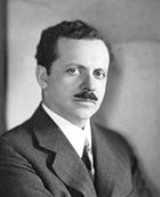
and propaganda
along with Ivy Lee
, referred to in his obituary
as "the father of public relations". Combining the ideas of Gustave Le Bon
and Wilfred Trotter
on crowd psychology
with the psychoanalytical
ideas of his uncle, Sigmund Freud
.
He felt this manipulation was necessary in society, which he regarded as irrational and dangerous as a result of the 'herd instinct' that Trotter had described.
The three main elements of public relations are practically as old as society: informing people, persuading people, or integrating people with people. Of course, the means and methods of accomplishing these ends have changed as society has changed.![]()
This is an age of mass production. In the mass production of materials a broad technique has been developed and applied to their distribution. In this age, too, there must be a technique for the mass distribution of ideas.![]()
The engineering of consent is the very essence of the democratic process, the freedom to persuade and suggest. ![]()
It is sometimes possible to change the attitudes of millions but impossible to change the attitude of one man.![]()
For the same reason I read the National Geographic, I like to see places I will never visit.![]()
The best place to find things: the public library.![]()
The best defense against propaganda: more propaganda.![]()
In almost every act of our lives, whether in the sphere of politics or business, in our social conduct or our ethical thinking, we are dominated by the relatively small number of persons [...] who understand the mental processes and social patterns of the masses. It is they who pull the wires that control the public mind, who harness old social forces and contrive new ways to bind and guide the world.![]()

